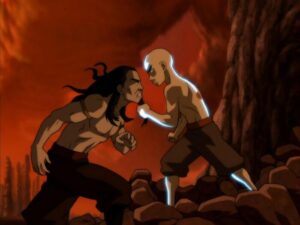No realm of animated television has managed to capture the human experience in its totality quite like Avatar: The Last Airbender. It’s a testament to masterful storytelling, coupled with deep philosophical musings and an emotional depth that transcends the boundaries of animation. A Nickelodeon production, Avatar delivers an immersive narrative that dives into the heart of existential questions, weaving them into the fabric of a world brimming with elemental poignant life lessons. Its 9.3 IMDB rating says a lot about how this cartoon is perfect for every age. This exploration peels back the layers of Avatar’s wisdom and illuminates how its life lessons can influence us.
The universe of Avatar, is a land where the elemental forces are not merely fantastical constructs, but potent symbols representing myriad life philosophies. It’s a series that calls on its viewers to ponder the grand questions of existence.
Before we delve deeper, a word of caution: this article contains significant spoilers from the series. If you’re new to the world of Avatar, we recommend experiencing its magic firsthand before venturing further. You can find the series on Netflix.
The Last Airbender
“Water. Earth. Fire. Air. Long ago, the four nations lived together in harmony. Then everything changed when the Fire Nation attacked. Only the Avatar, master of all four elements, could stop them, but when the world needed him most, he vanished. A hundred years passed and my brother Sokka and I discovered the new Avatar, an airbender named Aang. Although his airbending skills were great, he had a lot to learn. But I believe Aang would save the world.”
Avatar: The Last Airbender emerges with this iconic opening sequence. Katara’s voice gives hints to the audience that something special is about to come. Series keeps its promise by giving a mystic tapestry, woven with the timeless threads of elemental magic and spiritual wisdom. This saga of a young Avatar named Aang in a universe bound by the threads of harmony and balance.
It sure is a timeless tale that invites us to journey beyond the visible, to a place where elements speak, spirits guide, and every breath holds the potential for transformation.
The Harmony of Nature
Avatar introduces us to a world divided into four nations, each representing a unique elemental force: Earth, Water, Fire, and Air. This portrayal of elemental forces provides a profound perspective on the interconnectedness and co-dependency of nature’s elements. It underscores the need for balance, respecting every force, and maintaining harmony.
The series brings this idea to life in “The Swamp,” an episode where Aang, the protagonist, learns that everything in the universe is connected. It’s an invaluable lesson, encouraging us to perceive our surroundings as an integrated system where every life form has a role, a purpose, and a place.
Lessons of Life and Adaptability
Avatar offers a rich tapestry of life lessons, many hinging on the concept of adaptability. For instance, in “Bitter Work,” we see Aang struggling with earth bending. Earth is the opposite of air so, it is contrary to his character. But Toph, his earth bending teacher, helps him realize that he needs to confront his problems head-on, mirroring the steadfast nature of the earth itself. Even though it means he has to resist himself. It’s an analogy that applies perfectly to real life, teaching us to face our problems directly instead of avoiding them.
![]()
The Duality of Good and Evil
A recurring theme in Avatar is the duality of good and evil, effectively conveying that individuals aren’t innately good or evil, but are shaped by their experiences, choices, and environments. We witness this through Prince Zuko’s transformation from an antagonist to a hero. His journey emphasizes the importance of personal growth, redemption, and empathy.
One of the defining moments of Zuko’s arc appears in “The Crossroads of Destiny,” where he chooses to side with his sister, Azula, symbolizing his fall to the dark side. However, Zuko’s redemption arc in the later episodes—where he finally breaks away from his past mistakes and joins Team Avatar—shows that people can change and grow from their past, a powerful message about forgiveness and self-improvement.
“The Avatar and the Firelord” excels in painting the shades of good and evil. It explores how these elements exist in harmony within us, portrayed expertly through Aang and Zuko. Aang embodies balance, yet grapples with his past life’s mistakes, making him truly human. Zuko, a symbol of redemption, struggles with his dual heritage – both Avatar and Fire Lord. This struggle adds depth to his character. The episode cleverly uses these intertwined destinies to explore the complex dance of good and evil, making it a standout in the series.
Imparting Wisdom through Conflict
Throughout the series, we see battles not just as fights, but as arenas of moral conflict and philosophical discourse. “Sozin’s Comet,” the four-part finale, stands out in this regard. Here, Aang grapples with the ethical dilemma of killing Fire Lord Ozai, contradicting his belief in preserving life.

Ultimately, Aang chooses a path aligned with his values, stripping Ozai of his firebending powers instead of taking his life. This decision delivers a strong message about the importance of upholding one’s moral compass, even in the face of extreme pressure.
A Show that Will Impact Your Mind
Avatar: The Last Airbender immerses us in a world filled with philosophy and wisdom, brilliantly packaged within its compelling narrative. The philosophies it presents about nature, life, good, and evil provoke thought and reflection, often leading to profound realizations.
Through Avatar, we understand the importance of harmony, the necessity for adaptability, the duality of good and evil, and the essence of moral strength. These are lessons we can internalize, potentially altering our perspectives and, by extension, our lives. To call Avatar: The Last Airbender a simple children’s series would be a gross understatement. It’s a beautifully rendered philosophical journey that encourages us to examine and question our worldviews.
Mark your calendars for February 22, 2023, as Netflix brings the magic of the beloved series to life with a live-action remake of the original animated masterpiece. We have our doubts about it being as enchanting as the original series. Still, the opportunity to watch this amazing story once again, this time with an entirely Asian cast, should not be missed. And hopefully it erases that infamous movie from our minds. Fingers cross!

